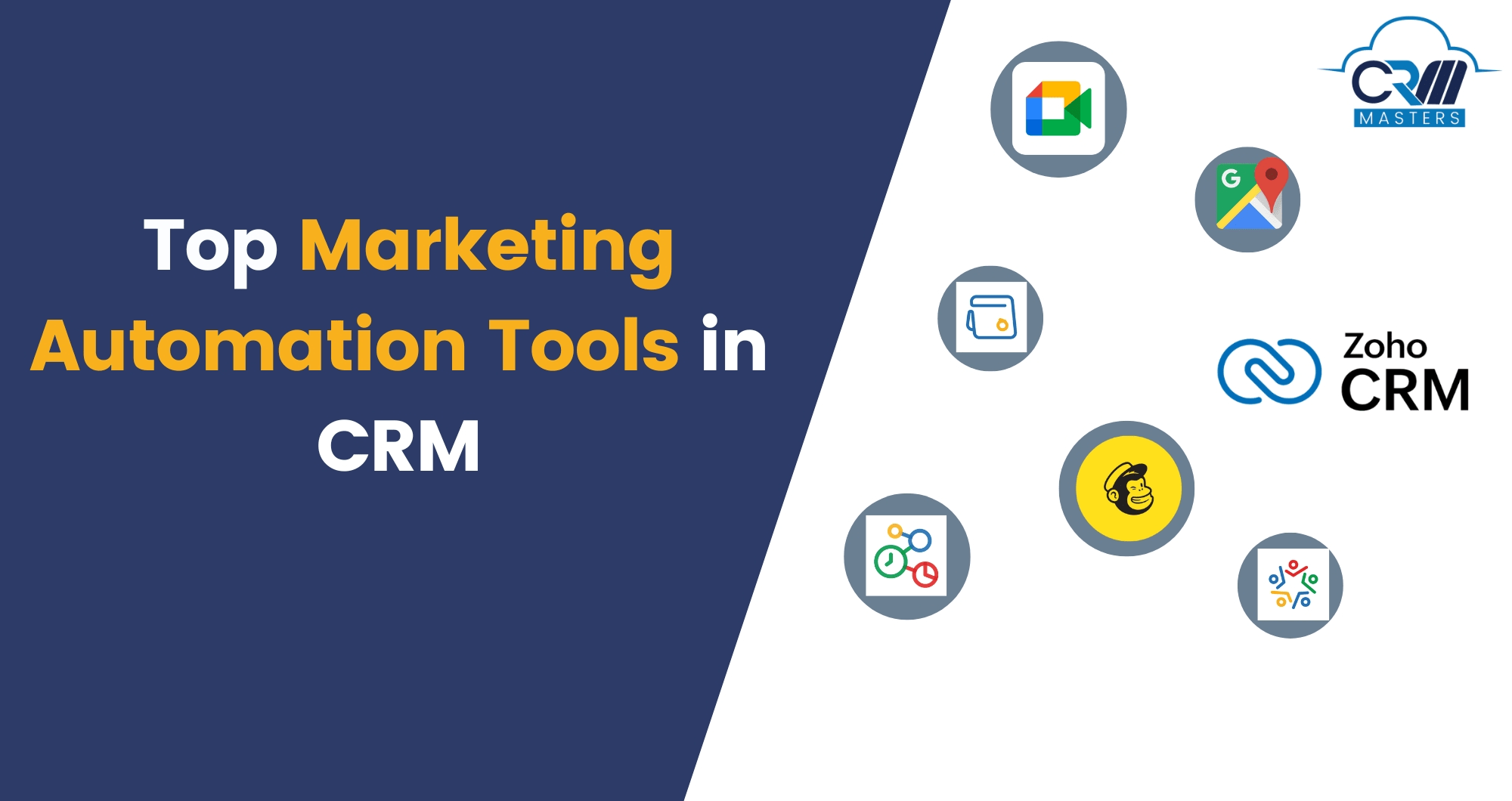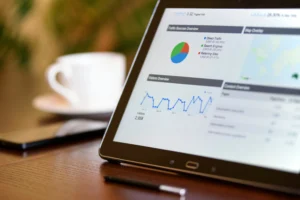
Integrating Marketing Automation Tools with CRM
You’ve got leads coming in, campaigns running across channels, emails flying out, and customer conversations happening everywhere, but are they all working together? That’s where the real magic happens. Nowadays, marketers can’t afford to juggle disconnected tools. You need systems that talk to each other, share insights in real time, and help you act faster. Integrating Marketing Automation Tools with your CRM, especially one as powerful as Zoho CRM, is the smartest way to do that under the guidance of a Zoho Implementation Partner.
When your marketing tools are integrated with CRM, every campaign becomes more targeted, every message more relevant, and every lead easier to convert. From email and social media to ads, meetings, surveys, and even WhatsApp, CRM connects it all in one unified workflow.
In this blog, we’ll explore some of the top marketing automation tools you can integrate with CRM, and how each one can make your marketing more seamless, strategic, and successful.
Is It Necessary to Integrate Marketing Automation Tools?

Imagine having customer data on one platform and marketing campaigns on another. Without integration, you’re constantly switching tabs, updating lists manually, and risking data mismatches. By integrating marketing automation tools, CRM ensures your team can deliver smarter, faster, and more targeted campaigns, with less manual effort.
With integrated marketing tools, you gain:
- Real-time sync of customer data.
- Automated workflows for lead nurturing.
- Better campaign tracking and performance insights.
- Personalized communication at scale.
Challenges of Running Marketing Without Automation

When businesses rely on disconnected tools or manual processes, marketing often becomes messy, slow, and ineffective. Here are some of the biggest challenges companies face when they do not integrate Marketing Automation Tools with their CRM:
1. Scattered Customer Data Across Platforms
Without integration, customer information is stored in silos, email in one tool, ad results in another, and leads in a spreadsheet. This makes it difficult to build a 360° customer view, and marketers often miss critical details that could help personalize campaigns.
2. Missed Follow-Ups and Delayed Responses
Marketing is all about timing. When follow-ups depend on manual reminders or separate calendars, opportunities often slip through the cracks. Slow responses make leads go cold, reducing conversion rates significantly.
3. Manual Workload That Eats Up Time
Updating contact lists, exporting campaign data, and manually assigning leads take hours that could be spent on strategy. Without automation, marketing teams spend more time managing tools than actually running campaigns.
4. Poor Lead Nurturing and Engagement
Leads rarely convert on the first interaction. Without automated workflows, it’s hard to nurture them with personalized emails, reminders, or messages at the right time. This results in unengaged prospects and lower ROI on campaigns.
5. Inconsistent Messaging Across Channels
If your email, social media, ads, and WhatsApp messages aren’t synced, customers may receive mixed or repetitive communication. This lack of consistency hurts brand credibility and confuses prospects.
6. Difficulty Tracking Campaign Performance
When campaign data is spread across different platforms, it becomes difficult to measure ROI. Marketers struggle to connect the dots between ad spend, email opens, and actual sales, making it hard to prove the value of marketing efforts.
7. Low ROI from Marketing Spend
All of the above challenges lead to one major issue: wasted marketing budget. Without Marketing Automation Tools, companies often overspend on ads, target the wrong audience, or fail to convert leads effectively.
Top Marketing Automation Tools You Need with CRM
Here are the most effective CRM integrations that marketing teams should consider:
1. Schedule Smart: CRM Integration with Zoho Calendar
Never miss a follow-up again! When you integrate Zoho Calendar with CRM, your meetings, calls, and tasks are automatically synced across both platforms. It’s perfect for marketing teams juggling multiple campaigns and client appointments. This integration keeps your schedule organized and your focus on strategic execution.
2. Ignite Impact: CRM and Google Meet
Organizing virtual events or product demos? With Google Meet integration, you can directly create and manage meetings from CRM for every new module entry. Meeting links are auto-generated and attached to CRM records, so your sales and marketing teams stay on the same page.
3. Stay in Sync: CRM Integration with Microsoft Outlook
Emails are still one of the most effective marketing tools, and this marketing integration makes it even more powerful. Sync your Outlook inbox with CRM to track every email conversation, schedule follow-ups, and convert email leads into opportunities without manual updates.
4. Email Campaigns that Work: CRM + Mailchimp
Want to run email campaigns that actually convert? Integrating Marketing Automation Tools like Mailchimp with CRM helps you segment lists, personalize messages, and track open and click rates, all while keeping your contact database up to date. It’s a must-have for email-driven marketing strategies.
5. Plan and Track Campaigns: CRM + Asana Integration
Marketing campaigns involve multiple moving parts, design, content, timelines, and approvals. By integrating Asana, a top project management tool, with CRM, you can track campaign progress, assign tasks, and stay deadline-driven while keeping customer insights close at hand.
6. Connect Where They Are: CRM Integration with WhatsApp
Customer engagement has gone mobile, and WhatsApp is leading the charge. With CRM and WhatsApp integration, you can send automated messages, campaign updates, and even follow-ups to your leads and customers directly from the CRM, creating a seamless messaging experience.
7. Drive More Leads: CRM Integration with Google Ads
Looking to maximize your ad ROI? This marketing integration syncs your Google Ads account with CRM, helping you track which campaigns, keywords, and ads are bringing in the most qualified leads. You can optimize spend and target high-converting audiences more effectively.
8. Grow Social, Stay Organized: CRM + Zoho Social
Social media isn’t just about likes, it’s about leads. Zoho Social’s integration with CRM lets you track and convert social media engagements into leads. Know exactly which posts brought in conversions, and follow up on every like, comment, or mention from within your CRM.
9. Capture Insights: CRM Integration with Zoho Survey
Want to know what your customers really think? Run surveys through Zoho Survey, and have the responses directly recorded in CRM. Whether it’s post-purchase feedback, NPS surveys, or market research, this integration turns opinions into actionable insights.
10. Map Smarter, Not Harder: CRM + Google Maps Finder
For local businesses or field marketing teams, knowing your customers’ exact locations can help personalize outreach. With Google Maps Finder integration, view client addresses, nearby opportunities, or plan in-person visits, right from the CRM dashboard.
Why Marketing Automation Tools with CRM Are a Must

Integrating Marketing Automation Tools with your CRM isn’t just an option, it’s a necessity. Top CRM’s, such as Zoho CRM, offer a wide array of marketing integrations that help streamline your workflows, improve targeting, and deliver consistent messaging across platforms. Consider consultation with a trusted Zoho Partner for the best Zoho Consultation Services to get a full evaluation of your business operations.
These integrations with CRM may significantly increase productivity and expand your business, regardless of whether you are leading a startup or an enterprise-level marketing team.
If you’re looking to scale your marketing without the mess, start integrating your Marketing Automation Tools with Zoho CRM today. Not sure where to begin? Our team at CRM Masters can help you set up, customize, and get the most out of your Zoho ecosystem.
Book your free consultation call now!
FAQs on Integrating Marketing Automation Tools with CRM
Q1. What are the best marketing automation tools for CRM integration?
Ans: Popular options include Zoho Campaigns, Mailchimp, HubSpot, and WhatsApp API. Each tool helps automate emails, track campaigns, and sync leads directly with your CRM.
Q2. Can I integrate Mailchimp with Zoho CRM?
Ans: Yes, Mailchimp integrates seamlessly with Zoho CRM. You can capture leads from sign-up forms, track campaign performance, and sync data in real-time.
Q3. How does CRM improve ROI in marketing automation?
Ans: CRM provides customer insights, lead scoring, and history of interactions. When combined with automation, campaigns are more targeted, reducing costs and boosting ROI.
Q4. Is marketing automation suitable for small businesses?
Ans: Absolutely. Marketing automation tools for small businesses save time, reduce manual effort, and allow SMBs to nurture leads just like large enterprises.
Q5. What is the benefit of integrating social media with CRM?
Ans: With tools like Zoho Social, you can track leads from Facebook, LinkedIn, or Instagram directly inside your CRM, making it easier to convert followers into paying customers.












